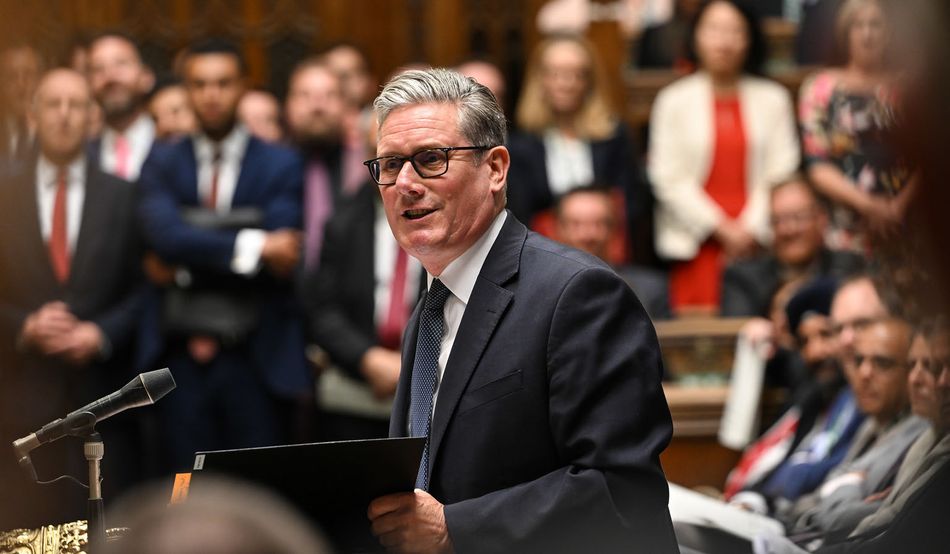You might imagine politics boils down to the old dilemma about how to win friends and influence people. But the real craft is just as often the judicious selection of enemies—and it strikes me that many problems facing Keir Starmer’s government boil down to his reluctance to pick the right foes.
The chauvinist right always has ready-made villains, of course: 100 years ago, east European Jews; 50 years ago, immigrants from the Commonwealth; and, today, hapless folks on the run from troubled parts of the world.
But great progressive politicians have also invoked demons to give themselves definition.
In the face of the greatest economic convulsion in history, Franklin Roosevelt gave a master-class in the blame game: pointing the finger at money changers who’d fled the Temple on his first day in office, and then at monopolists, profiteers and reckless bankers as his term ground on. Labour’s winning 1945 pitch to be seen as the party of the whole British nation none-too-subtly presented spivs and speculators as enemies of that common good. Floored for a while by the financial markets, the Lazarus-like Harold Wilson raged against the “gnomes of Zurich”.
Crude diversion of public resentment away from the politicians making such speeches is, inevitably, part of the aim. But for reformers, hoping to refine the rules of the economic game, there is also a nobler purpose. Nothing inspires support for change like a case study in ill-gotten gains.
During the 2010s, George Osborne artfully targeted benefit cuts on supposed “shirkers”, yet another politically useful enemy. Resistance was mostly doomed, but once campaigners alighted on the way a particular earn-your-benefits scheme would result in Tesco getting their shelves stacked for free, the tables turned. The public, it transpired, regarded corporate spongers as a worthier enemy than the endlessly maligned residents of Benefits Street.
Today the government is tasked with simultaneously overcoming business resistance to new regulation on workers’ rights and one large tax rise on employers that it has already announced, all in the knowledge that—despite earlier reassurances to the contrary—further tax rises this year are now likely to be necessary. This is a formidable political challenge, which it is hopeless to imagine can be achieved without making enemies.
It is important to be selective, and not insult or deter the committed investors and good businesses that can support economic recovery. Pinpoint exactly the right enemies, though, and progressive politics could become more tractable. From the bankers who crashed the economy in the first place right up to the boss of one of the hated privatised water companies, newly exposed as having half of her outsize remuneration quietly paid by a private equity parent company, the public is driven mad by people doing very nicely out of tricks that no ordinary person could pull.
Rather than pick a fight, however, the Starmer administration seems to hope it can, somehow, get the country singing in unison behind a vague quest for “growth”, whose fruits can then be used to make all conflict go away. More national income would—for sure—ease some of the nastiest dilemmas on tax and public services. But it won’t rapidly diffuse all the resentment that has built up over two decades of stagnant living standards—particularly not if there is resentment about what exactly it is that is to be grown.
Consider the government’s reported readiness, before last week’s Supreme Court ruling, to legislate to provide retrospective protection to financiers paying kick-backs to car salesmen. Even if such action were sincerely judged to be “good for growth”, voters would have been unimpressed. Ministers are now facing a predictable backlash for having even entertained putting financially powerful interests ahead of blameless consumers. It’s not the first time that a desire to placate instead of take on the former has left them in an uncomfortable place. In just a few months, Rachel Reeves went from decrying the removal of the bankers’ bonus cap as telling “you all you need to know” about the Tories to letting slip that it was something she herself preferred not to impose.
It’s not fair to charge the government with being unwilling to nurture any economic enemies. It has attempted to rally the public against the “blockers” on behalf of “the builders” that threaten the cherished views of those blockers. Its other great villain has, most unexpectedly, turned out to be bats. The PM and chancellor have both latched on to the ruinously expensive tunnel which had to be constructed to protect the creatures in order to square a stretch of HS2 track with environmental regulations. They have made demon bats a rhetorical icon of the many rules that exist to protect nature and wildlife, including many cuddlier mammals.
These winged and unwinged enemies may—or may not—eventually help Starmer prevail in rows about building homes and infrastructure. But if the aim were to win the hearts of Middle England for a wider reset of the economic settlement, then he would be well advised to search out some very different antagonists for that job.












